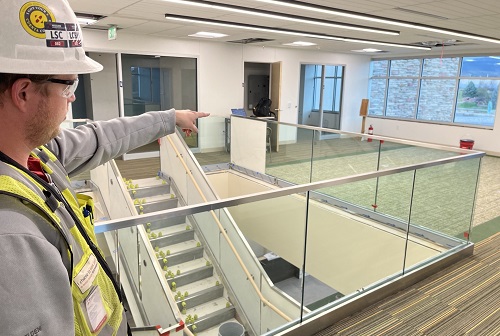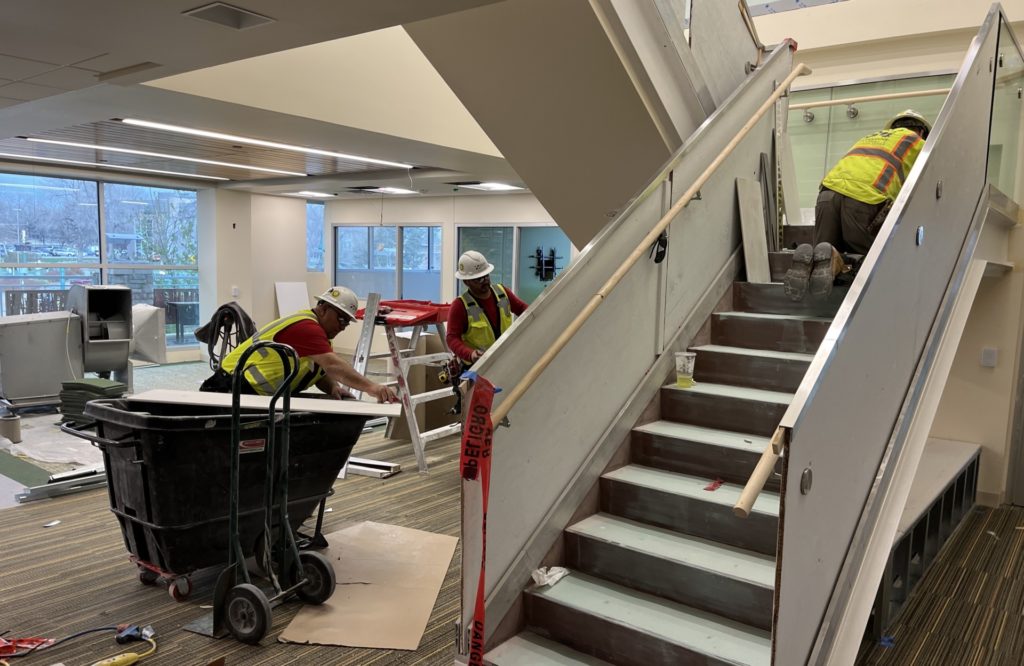Remember the shortage of toilet paper during the pandemic and, more recently, the shortage of eggs in grocery stores?
Facilities Management leaders at Colorado State University (CSU) say they are still feeling those same effects—but for different products. They are seeing supply chain issues and worker shortages causing longer wait times when trying to acquire certain items needed for construction, renovations, and other improvement projects.

But CSU employees have found innovative ways to deal with delays in procuring products, especially items related to the trades (such as plumbing or electrical) as well as mechanical, audiovisual, engineering, and professional design fields.
Dan Kozlowski, assistant director for remodel and construction services, said there is currently a 26-week lead time for certain high-tech products, such as touch panels and presentation systems for classrooms and conference rooms. Luckily, CSU still has many of those old-school television carts that can be wheeled into rooms when necessary.
He said components like coolers, pumps, and a chiller for overhauling the HVAC (heating, ventilation and air conditioning) systems in the Vocational Education Building at the corner of University Avenue and Mason Street were ordered in May 2022. At first, they were expected in November, then they were pushed to March, but now they won’t arrive until about a year after they were purchased.
Keeping Cool
Sandy Sheahan, associate director of operations for Facilities Management, said there is a 13-week wait for air conditioning units used to keep servers cool in computer rooms, so staff have turned to using portable AC floor units in the meantime. She said vendors often won’t even consider letting buyers pay more to have shipments expedited, since demand is so high.
“It’s affecting everything,” Sheahan said. “We really appreciate the patience of the university community.”
Kozlowski explained that while signs are starting to point to a return to normalcy, such as growing stability in the retail sector, CSU employees should “plan ahead and keep these things in mind” when embarking on projects requiring products that are in high demand.
“Everybody’s working together and bearing the impact together,” he said.
“The silver lining is our people, and how well they are dealing with these issues,” added Ashraf Fouad, assistant director for engineering and capital construction.
Stockpiling in Advance
Kozlowski said other tactics that CSU has used to deal with anticipated wait times include ordering equipment and products far in advance, creating longer project schedules, and stockpiling materials. For instance, Facilities Management acquired and stored supplies of steel studs and drywall during the pandemic, keeping them in a warehouse in anticipation of future demand and price hikes. He said CSU staff also stockpiled LED light panels immediately following the pandemic after seeing there was a 12-week wait list for them.
Kozlowski said the extended timeframes have been caused by a variety of factors, including the natural rebound of demand after the pandemic, natural disasters like recent freezes in Texas, and the lack of workers in key fields, including trades like plumbing.
Plus, during the pandemic, many workers took early retirement or got used to working from home.
“People took off and never came back,” Kozlowski said.
“But unfortunately, these are jobs you cannot do from home,” Fouad added.
Effect on LSC project
The revitalization of the Lory Student Center (LSC) has remained on schedule for the most part—the initial deadline was May, and it should be complete by August. However, the budget was adjusted to accommodate the region’s 32% rise in construction costs over the last two years.

Mike Ellis, executive director of the LSC, said project manager Tracey Abel and the construction team have done a masterful job negotiating complicated deadlines and shifting expenses. At one point, he said, planners began to limit the project’s scope given uncertainty with the market, but they restored elements once it was clear the project would meet its base budget. Ellis added that the team locked in interest rates at just the right time, which helped.
“In sum, we couldn’t be more pleased with having navigated a complex set of budgetary constraints within a rapidly changing construction environment, along with meeting all of our progressive milestones in what has been a complex schedule,” he said. “I couldn’t be more pleased with the project outcome, given the circumstances and constraints that our construction team has skillfully and meticulously navigated.”
Jeff Dodge is director of internal communications at CSU. This article was originally published on the CSU news site and was republished with permission.
